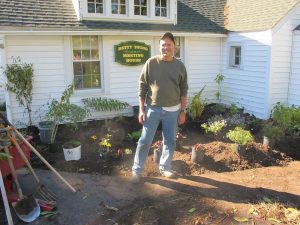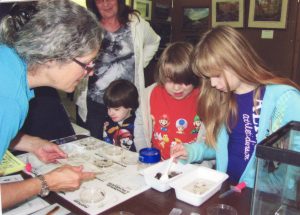You can become a Master Naturalist by taking the mandatory “Naturalist Trainee” course (16 credits), supplemented by 14 hours of additional coursework and 30 hours of volunteer work tailored to your personal interests. The mandatory “Naturalist Trainee” course is held at Cornell’s Arnot Teaching and Research Forest, and occasionally at other regional locations. Additional courses may be taken through webinars or programs offered by other educational entities and pre-approved by Master Naturalist faculty. Participants are also encouraged to submit local webinars, workshops and trainings they find locally to the Director for approval (email kls20@cornell.edu).
The “Naturalist Trainee” course fulfills the requirements for 16 of the total 30 credits.
Volunteer Requirements – 30 hrs
Volunteer opportunities may include “hands-on” conservation monitoring, habitat enhancement activities, or educational outreach. Examples of possible conservation activities include working with a local land trust to remove invasive species, monitoring wildlife, working at a local deer check station, inventorying wildflowers at a local park or preserve, participating in a citizen science project. Potential outreach activities may include leading a “woods walk”, writing articles, giving presentations, developing educational brochures.
Volunteer activities should be geared towards citizen science, conservation and outreach. For instance, while doing a trail cleanup would NOT count, creating a self-guided interpretive walk in your local preserve or park would! For ideas about volunteer ideas, check out our featured Master Naturalists or our volunteer opportunities map.
Volunteer activities should be submitted to and approved by the Master Naturalist Program Director ahead of time if there is any doubt that the activity qualifies for credit. A “volunteer supervisor” from the participating entity needs to be identified and may be contacted to confirm volunteer efforts.
Program Completion

Tim Kennelty standing by the native plant display garden he created at the Columbia County Cooperative Extension office.
As coursework and volunteer hours are completed, participants should submit each class or volunteer activity completed to our online database. Paper forms are provided in your program binder to help you maintain a record of activities and courses you have completed, as well as which activities you have submitted to the online database. Once you believe you have fulfilled all of the requirements and submitted them online, please contact the Director for review of your credits.
Maintaining Master Naturalist Status
To maintain Master Naturalist status, participants must submit coursework or volunteer activity annually to the database. There is no minimum number of hours required each year, however some effort must be submitted.
Click here to download this information in PDF form
Achieving Additional Master Naturalist Levels
Once a volunteer has achieved Master Naturalist status, they must complete a certain number of hours of training and volunteer service to advance to the next Level. Specific leveling requirements are as follows:
- From Level 1 to Level 10, Master Naturalists must complete 8 hours of training and 20 hours of volunteer service to advance to the next Level.
- After achieving Level 10, Master Naturalists must complete 16 hours of training and 40 hours of volunteer service to advance to the next Level.
- After achieving Level 20, Master Naturalists must complete 32 hours of training and 80 hours of volunteer service to advance to the next Level.






